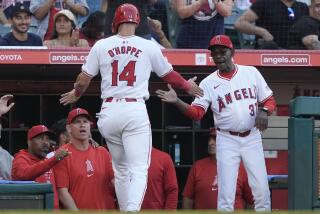Baseball’s options rule: Three and you’re out
- Share via
Brandon Wood of the Angels is out of options. Literally. Figuratively. Any way you slice it.
But what does that mean?
It is baseball’s limbo. Like his teammate, catcher Bobby Wilson, Wood exists now at the mercy of rules that, while made to protect his rights as a player, limit his wiggle room and that of his team. Nor can he complain much, because he could have made this a non-issue by hitting better.
We ask Ken Forsch, former All-Star pitcher and now Angels assistant general manager, to explain for 10 minutes all this options and waivers and outrighting stuff we read about every. He laughs at the 10-minute part.
Later, we see Angels Manager Mike Scioscia and tell him what we hope to explain in a column.
“Good. I’ll read that myself,” Scioscia says. “Maybe then I’ll understand it.”
Forsch is the man with the computer. He works directly with General Manager Tony Reagins as the team weaves its way through the intricate maze of rules governing baseball rosters. He had a 16-year big league career, but that did little to prepare him for the complications of this job, which he has held for 17 years.
Most often, he is the one who hits the final computer key that affects a multimillion-dollar player and his multimillion-dollar team.
“Sometimes, I get a little bead of sweat just before I push that send button,” he says.
Wood’s situation is that he has used up all three of his options, which allow him to be on a major league team’s 40-man roster but still move freely between the major and minor leagues. That protects a player from becoming frozen behind a superstar, kept on only as insurance.
Wood, who is 25 and has hit bombs through seven minor league seasons, was on the Angels’ 40-man roster in spring training in 2007, ’08 and ’09. That’s three option years, and he was up and down each of those years. But that’s all he gets, not just for the Angels, but in his career.
This was to be his year. Third base was open. The Angels were confident Wood could take over, hit maybe .250, field his position well and grow with a veteran team around him and the patience of Scioscia, just a tad shy of the patience of Job, guiding him.
But Wood’s batting average has hovered around.150 while the Angels played sub-.500 baseball, creating a restless fan base and an urgency to fix things that aren’t working. Like Wood.
The Angels had three basic options.
He could be traded — and no waiver notice is needed before the July 31 trade deadline. A trade at this point seems unlikely, though, because the Angels have much invested in Wood and lots of faith and hope remain, and a player hitting a buck-fifty doesn’t bring much in return, anyway. And remember, any team trading for Wood faces the same obstacle of not being able to send him to the minors. His options are used up.
He could be put on release waivers, meaning the moment Forsch hits the send button, Wood is no longer an Angel. Other teams have two days to claim him, pay $1 and pick up his salary but have to put him on their major league roster. If more than one team claims him, the team with the lowest winning percentage gets him.
Or he could be put on outright waivers, which means if Wood clears waivers with no claims, the Angels can pull him back as theirs. Then, they have the new option of not only keeping him but sending him to the minors. But they have to do that before the current waiver period ends July 31, or they have to get him through the outright waiver list again.
Of course, as in life, there are little tricks. One is called the SCI, Sudden Convenient Injury. Wood has a hip flexor injury and went on the 15-day disabled list Tuesday. Forsch says Wood hurt it in the Cardinals series and “my understanding is he really hurt it in batting practice after that.” He said it with a straight face, which is his job.
When Wood is better, he can take a rehab assignment. That is as much as 20 days for a position player and can start any time in that 15-day DL period.
And where would Wood do his rehab? Well, at either Rancho Cucamonga or Salt Lake City, both Angels minor league teams, where, given his situation, the Angels would have sent him anyway.
More to Read
Go beyond the scoreboard
Get the latest on L.A.'s teams in the daily Sports Report newsletter.
You may occasionally receive promotional content from the Los Angeles Times.







